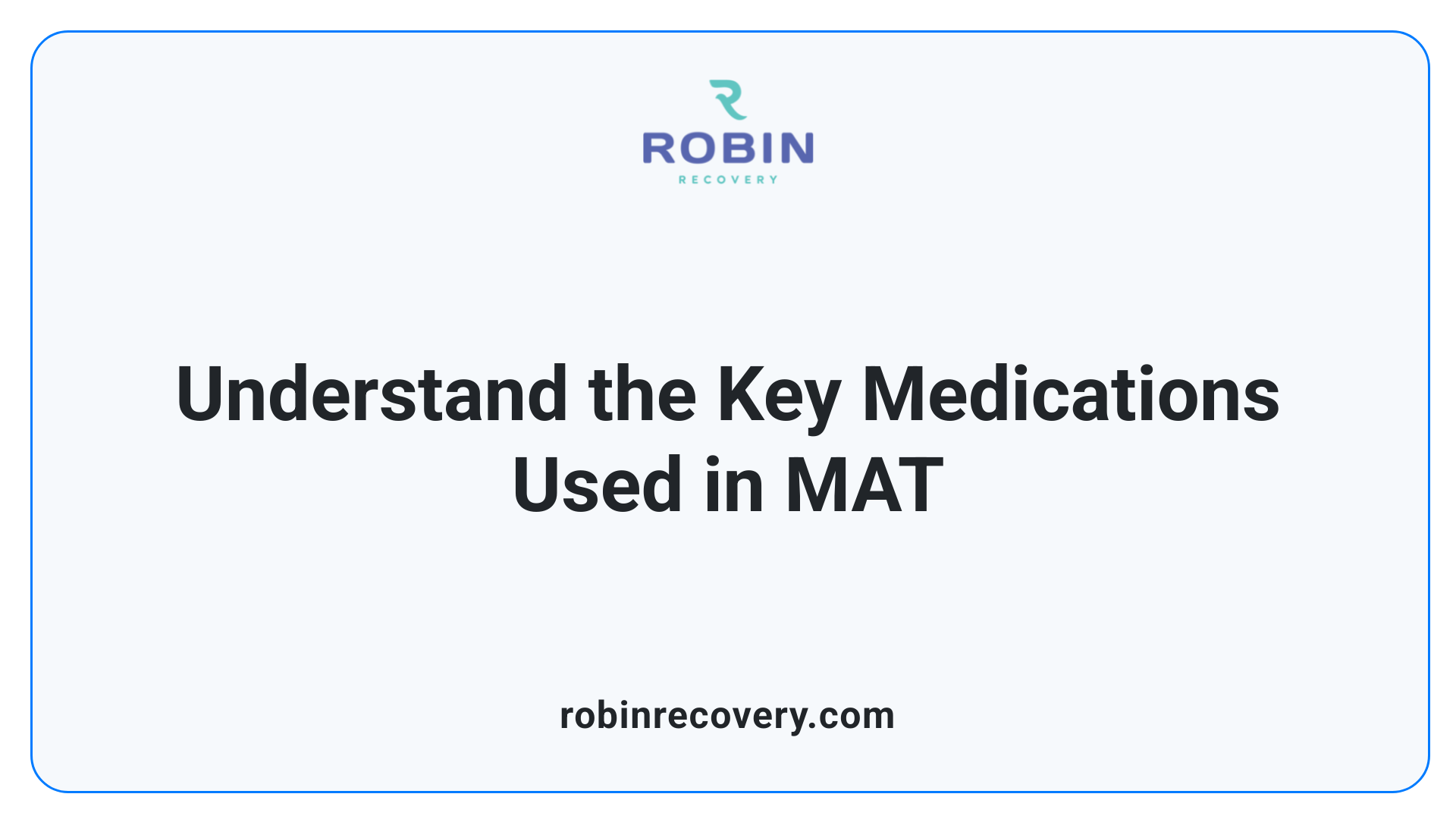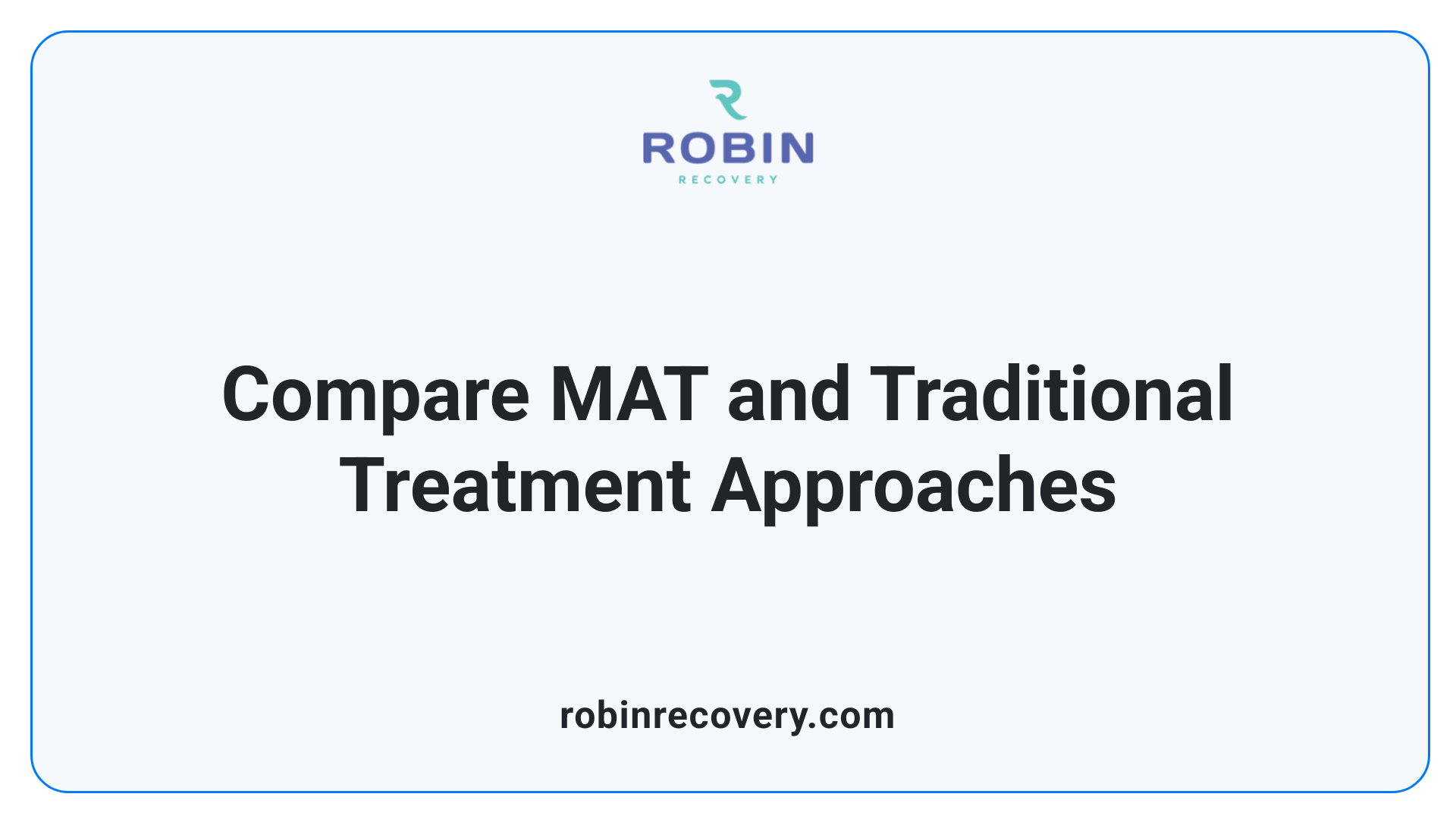How Medication-Assisted Treatment Helps Improve Recovery Outcomes

Introduction
Medication-Assisted Treatment (MAT) has emerged as a groundbreaking approach to treating substance use disorders, particularly opioid use disorder (OUD). This method combines FDA-approved medications with counseling and behavioral therapies, forming a comprehensive strategy to manage addiction and improve recovery outcomes. In this article, we explore how MAT works, its benefits, the types of medications involved, and how it compares to other treatments.
Understanding the Mechanism of MAT

What is Medication-Assisted Treatment (MAT) and how does it work?
Medication-Assisted Treatment (MAT) represents a progressive approach to addressing substance use disorders, particularly for those grappling with opioid and alcohol dependencies. This treatment model utilizes FDA-approved medications in conjunction with behavioral therapies and counseling, creating a holistic strategy for recovery.
The medications used in MAT—such as buprenorphine, methadone, and naltrexone—function by targeting the brain’s opioid receptors, which decreases cravings and alleviates withdrawal symptoms.
- Buprenorphine: A partial agonist that eases cravings and withdrawal while limiting the euphoric effects associated with full agonist opioids.
- Methadone: A long-acting opioid that similarly stabilizes individuals by blocking the effects of other opioids while preventing withdrawal.
- Naltrexone: An antagonist that blocks the effects of opioids and promotes abstinence.
By addressing both the physical and psychological aspects of addiction, MAT not only facilitates a smoother detoxification process but also aids in restoring normal brain function. Patients are often better positioned to engage in psychosocial therapies that enhance treatment adherence and community integration.
Access to MAT has vastly improved with resources like SAMHSA’s National Helpline, which provides confidential assistance to anyone seeking help. The overall framework of MAT embodies a commitment to patient-centered care, focusing on individual needs to bolster long-term recovery outcomes.
The Multifaceted Benefits of MAT

What are the benefits of Medication-Assisted Treatment (MAT)?
Medication-Assisted Treatment (MAT) offers numerous benefits for individuals struggling with substance use disorders, particularly opioid use disorder (OUD). By combining FDA-approved medications with counseling and behavioral therapies, MAT addresses both the physical and psychological aspects of addiction effectively.
Physical Aspects of MAT
The medications used in MAT, including methadone, buprenorphine, and naltrexone, serve essential roles in the recovery process:
- Withdrawal Symptom Management: These medications help alleviate uncomfortable withdrawal symptoms that can deter individuals from seeking help.
- Craving Reduction: By significantly reducing cravings, MAT allows individuals to focus more on treatment rather than punishing withdrawal effects.
- Blocking Euphoria: Naltrexone is particularly notable for blocking the euphoric effects of opioids, enabling patients to recover without the risk of becoming high on these substances.
Psychological Aspects of MAT
The psychological benefits of MAT are equally impactful:
- Improved Treatment Adherence: Patients receiving MAT are more likely to remain engaged in their treatment plans, benefiting from regular counseling and support.
- Enhanced Quality of Life: MAT promotes better life outcomes by enabling individuals to regain stability, participate in daily activities, and improve personal relationships, resulting in higher rates of employment and social functioning.
- Holistic Recovery Process: This treatment approach supports a successful recovery journey, facilitating the normalization of brain function while addressing the root causes and consequences of addiction.
Overall, MAT is instrumental in fostering long-term recovery success, significantly enhancing patients' overall health and quality of life.
Measuring Success: The Outcomes of MAT

What are the outcomes of Medication-Assisted Treatment (MAT)?
Medication-Assisted Treatment (MAT) has shown significant positive outcomes for individuals struggling with substance use disorders. Among the most notable benefits are:
- Reduction in Illicit Substance Use: MAT effectively reduces opioid misuse. Evidence indicates that patients receiving methadone showed a 33% decrease in opioid-positive drug tests.
- Improved Treatment Retention: Retention rates in treatment programs are enhanced, with those on methadone 4.44 times more likely to remain in therapy than those without MAT.
- Increase in Survival Rates: MAT profoundly impacts survival rates, particularly in the context of opioid overdoses, leading to a reported 59% decrease in overdose deaths among methadone users and a 38% decrease for buprenorphine users.
What are the health and social impacts of MAT?
Beyond personal recovery, MAT contributes positively to broader health and social outcomes. Some key points include:
- Management of Co-occurring Disorders: MAT facilitates concurrent treatment of mental health and physical conditions, enhancing overall well-being.
- Decrease in Criminal Activity: Studies demonstrate that MAT reduces criminal behaviors associated with drug-seeking, fostering improved social adjustment.
- Reduction of Infectious Diseases: By decreasing drug use and needle sharing, MAT lowers the transmission rates of HIV and Hepatitis C, promoting public health.
In examining MAT's success, it's essential to acknowledge existing barriers to access. Nearly 30% of pharmacies impose restrictions on MAT prescriptions, underscoring the need for increased accessibility. Improving these access issues can catalyze MAT's effectiveness in the fight against substance use disorders for a larger population.
The Core Medications in MAT

What types of medications are used in Medication-Assisted Treatment (MAT)?
Medication-Assisted Treatment (MAT) for opioid use disorder primarily utilizes three FDA-approved medications:
- Methadone: A full opioid agonist that helps alleviate cravings and withdrawal symptoms. However, it comes with a higher risk of misuse and overdose.
- Buprenorphine: A partial opioid agonist that serves to reduce cravings and withdrawal symptoms while limiting the risk of overdose. Buprenorphine is available in various formulations, including Suboxone, which combines buprenorphine with naloxone to deter misuse.
- Naltrexone: A non-addictive opioid antagonist available in an extended-release injectable form. It helps manage cravings and prevent relapse by blocking the effects of opioids.
How effective and safe are these medications?
Research highlights the effectiveness and safety of these medications. All three have demonstrated significant benefits in reducing opioid use:
- Methadone: Patients receiving methadone showed 33% fewer opioid-positive drug tests and were more likely to remain in treatment longer compared to controls.
- Buprenorphine: Studies indicate that higher doses of buprenorphine (16 mg or more) significantly increase treatment retention and decrease opioid-positive drug tests by 14.2%.
- Naltrexone: Extended-release injectable naltrexone has shown a 90% abstinent rate in one study compared to 35% with placebo, indicating a strong effectiveness in maintaining opioid abstinence.
In summary, all three medications are considered safe and effective within the context of a comprehensive treatment approach, particularly when combined with counseling and behavioral therapies, leading to enhanced recovery outcomes.
MAT versus Traditional Treatment Methods

How does Medication-Assisted Treatment (MAT) compare to other treatment methods for opioid use disorder?
Medication-Assisted Treatment (MAT) for opioid use disorder merges FDA-approved medications like methadone, buprenorphine, and naltrexone with psychosocial therapies, enhancing treatment effectiveness. Methadone has been a staple since the 1960s, effectively mitigating cravings and withdrawal symptoms, yet its strict regulation limits widespread use. Buprenorphine, characterized as a partial opioid agonist, is preferred in many programs due to its lower overdose risk and better treatment retention outcomes. It stabilizes patients while reducing the likelihood of fatal overdose. In contrast, naltrexone, particularly in its extended-release injectable form, can promote sobriety, but it faces challenges in patient adherence, making it less effective for some individuals compared to buprenorphine. Thus, while all medications have benefits, buprenorphine generally provides higher rates of treatment success.
How effective is Medication-Assisted Treatment (MAT) according to statistics?
Numerous studies illustrate the effectiveness of MAT in treating substance use disorders. Retention rates hover around 50% in high-income countries, with a slight increase to an average of 54.3% in low- and middle-income regions after 12 months. Specific MAT types demonstrate varying results: methadone programs show higher retention rates at 56.6%, whereas buprenorphine programs sit lower at 48.3%. Notably, programs exceeding a 24-month follow-up achieved retention rates of 74.5%. These statistics highlight MAT's ability to substantially improve patient outcomes and decrease illicit drug use, making it a pivotal element in the treatment landscape compared to traditional approaches, which often do not yield similar retention or efficacy.
Conclusion
Medication-Assisted Treatment (MAT) offers a pivotal solution in the fight against substance use disorders by integrating medical, psychological, and social approaches. With approved medications and evidence-based therapies, MAT not only targets the root causes but also supports holistic recovery, reducing the risk of relapse and improving life quality. Continuous research and support from health authorities underline its indispensable role in addiction treatment, yet expanded access and awareness are vital for broader implementation. As such, MAT stands as a cornerstone of effective recovery strategies.
References
- Medication-Assisted Treatment Improves Outcomes for Patients With ...
- How effective are medications to treat opioid use disorder?
- Medication Assisted Treatment - Yes NM
- Medications for Substance Use Disorders - SAMHSA
- Medication-Assisted Treatment FAQ
- 5 Proven Benefits Of Medication Assisted Treatment (MAT)
- What is Medication-Assisted Treatment and How Does It Work?
- [PDF] Medication-Assisted Treatment Improves Outcomes for Patients With ...
- Benefits of Medication Assisted Treatment - BrightView
- How Effective Is Medication Assisted Treatment
